ANC: Lessons beneath pearls of laughter
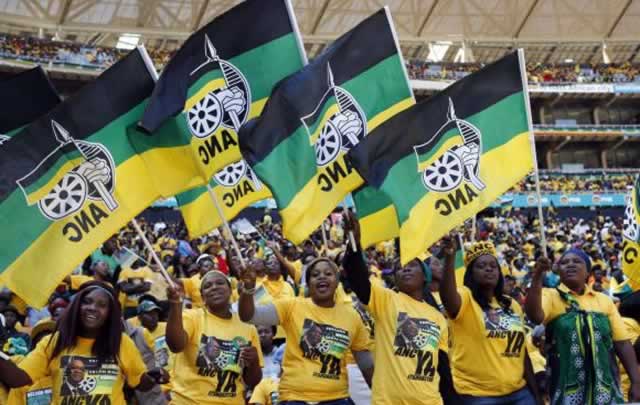
 Nathaniel Manheru The Other Side
Nathaniel Manheru The Other Side
WITH mere dregs of results from the plebiscite still trickling in, the picture on South Africa’s fifth democratic and non-racial vote is virtually clear.
The ANC is set to win overwhelmingly, albeit falling short of the coveted two-thirds majority it needs to change the constitution. For that, it has to look up North to Zanu-PF, its sister liberation movement, which secured that in the July 2013 plebiscite. Bravo ANC! Aluta Continua! Mayibuye Afrika!
The ANC has done South Africa proud. It has done Southern Africa proud, indeed done Africa proud. Above all, it has vindicated the cause of national liberation movements in our regional neighbourhood. We turn next to Frelimo, which, too, must win.
The cause that must triumph
The cause and ethos of liberation movements must continue to triumph and define our region, define its politics and frame its economic trajectory. About that there should be not an iota of doubt. Cast your most indulgent eye in the opposition corner in our region, and tell me if you see any beauty, any future.
Our region seems cursed with an oppositional framework that swings between quisling politics and brazen banditry. Neither ends nor their in-betweens promise a good legacy or prospect for our region. This is why we must hail the ANC victory, the same way progressive Southern Africa hailed the Zanu-PF victory last year.
A necessary jolt
But like progressive revolutionaries, lessons must be drawn candidly, drawn even within the context of the joy of victory and inter-party solidarity. The ANC has endured a slight dip in support, in the process losing its two-thirds majority.
This, in and by itself, need not spell doom. Even liberation movements do require and deserve periodic jolts, for as long as such jolts fall short of fatalities. Zanu-PF has had a surfeit of such jolts, might very well be preparing for yet another one, should it fail to translate the overwhelming vote it got last year into a clear, directional welfare enhancing programme.
Our experience in the region is that although the voter will not deploy a spear for censure, they will not hesitate to pinch the ear of ruling liberation movements that grow complacent, let alone indifferent. Or get too self-preoccupied, succession politics being one form of such political solipsism, and corruption another.
Marikana blunder
Between elections, the ANC made three key blunders, and this column did not spare it. My relationship with liberation movements has always been a conscious one, well founded on critical view within a framework of unconditional broad support. First, Marikana was a disaster. No liberation movement should shoot the citizenry, worse so in the interest of foreign capital which has enervated the continent, which has pillaged our destiny.
That must never happen and the ANC has paid somewhat for Marikana. Thank God there was the EFF to supply some form of release to the dissent wrought by this never-to-be-repeated outrage. My mortal fear was in this organic vote of the liberation movement migrating to some unseemly home, worst of all the DA. Or simply withdrawing into itself by way of apathetic protest. Both did not happen, as the protest was absorbed by the EFF.
Malema factor
Second, the expulsion of Malema created an unnecessary dilemma to members and supporters of liberation movements. Inside the ANC, it triggered a needless debate which loosened its cohesion, all for very little benefit. Ideologically, this was a dispute of little stakes, but high costs. Simply, the whole altercation suggested (and still does) some poor skills in handling energy in the movement.
Definitionally, the youth wing of any party generates lots of heat, much of it scalding, destructive even. The youths know no measure. But it is heat that is managed by lengthening distance between its smoulder and the stool on which warming elders are perched. Not by dousing the fire against creeping winter.
Versatile ANC
Thankfully the ANC made up for its blunder on this one, and this is how. One admirable thing about the ANC and its campaign was its quiet but effective style. Key to that approach was its real and resile membership structures on the ground. It is a well-wrought movement, with solid, impenetrable structures. It did not have to rely on rallies, themselves the recourse of organisationally weak parties.
With the ANCYL badly blunted by the Malema saga, the ANC showed great malleability by filling the void left by a weakened ANCYL. The same is the story with the mercurial and divided Cosatu. Caught in the throes of internal contradictions, and ideological fastidiousness externally, Cosatu was another void the ANC had to grapple with, indeed an albatross that hung it down. It grappled with this albatross successfully.
That adroit adjustment not only mitigated any likely setbacks; it reinstated the supremacy of the main body within the ANC, reinstated the supremacy of the ANC in the broad alliance whose ambitious and even rebellious constitutive parts threatened to grant the ANC some hostage status akin to that suffered by the British Labour Party before Blair.
Today the ANC can refashion the alliance, indeed can restructure the Youth League without the sense of some shotgun nudging its fontanel. But a cost has been exacted. The six comma something which now goes to the EFF is part of ANC’s organic vote tragically exfoliated by internal tensions which could have been avoided if matters had been handled differently. I will come back to this key consequence.
Nkandla and the leadership
Third, Nkandla was a perception disaster for the ANC, principally its leadership. Whatever the facts about the project, whatever the amounts involved, whatever the number of rules allegedly bent or upheld, Nkandla was skilfully used by the combined opposition to project a venal leadership ANC did not deserve.
It is wrong and improper for a liberation movement to concede even an inch of high moral ground to a negative opposition such as the white DA. Or for that liberation movement to find itself in circumstances in which it encourages the formulation of a chastising idiom for use by the opposition, both in the present and in the future.
Zuma will enter his second and last term with a writ hanging above his head. Those are the pitfalls of governance, and I still insist every liberation movement has to go through such to mature.
Did we not have our Willowgate here? As long as there is an awareness that the costs can be big and lasting. Give it to the ANC, it has shown an adeptness to survive its blunders, and that is key.
And now the future . . .
The 2014 elections firmly put on the agenda a social programme the DA dreads, the ANC has been reticent about, the EFF hopes to nurse for its own rise. The fact of citizens burning a voting post ahead of the polls, all on grounds that the voter needs toilets, water, electricity and housing ahead of the ballot and all its democratic accoutrements, says a lot about a maturing social question which cannot be wished away.
It makes the sixty-two point something which the ANC has bagged an assignment for future work, not a measure of satisfaction with past deeds. It is promissory faith. That means the ANC will have to take a more robust line on the social scene, something which could very easily qualify its long dalliance with capital.
There is a growing consciousness of social inequities which the ANC may never again appease or buy through a skilful deployment of history and Mandela. Concrete gains would have to be notched, principally to mitigate social conditions in townships.
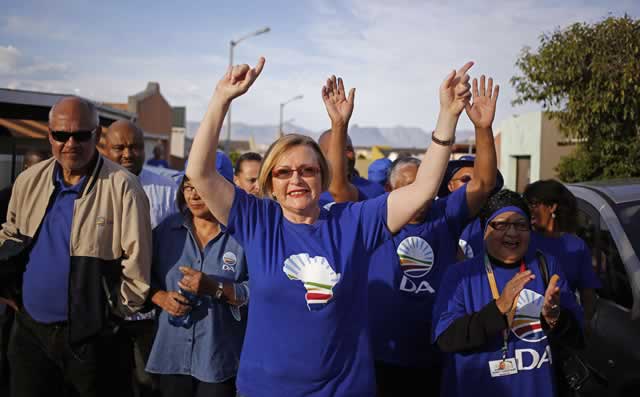 The matter DA can’t colour
The matter DA can’t colour
But the curse is also the beauty of it all. As this discourse on African social conditions deepens and gets shriller, so too will the DA show it’s true white colours, show why its support remains along the white-dominated coastline, as if about to board the repatriation ship!
It is a discourse sure to gooseflesh it. The DA is a party of the propertied. And as that happens, the political debate will get racially polarised. Not because of reverse racism, but simply because that is the colour of social unfairness in that country. In such an eventuality, there are two sure gainers: a radicalising ANC, or a strident EFF which provides emotional refuge to an expectant but disappointed ANC cadre, supporter or sympathiser.
EFF, uuuh, much rests on the abilities of its youthful leadership to keep together, and also critique the ANC but without becoming another DA or Inkatha. Or worse, COPE or A-Gang.
The last two came out of the ANC, but to represent the interests of big capital wistful about the direction of the ANC. Whatever verbiage of liberation the two mustered, they openly disavowed its agenda, even pillorying sister liberation movements like Zanu-PF.
As the practicalities of governance show on the ANC, the EFF could very well be invited to vote with the ANC on big constitutional questions that impact on the social conditions of the people. This could be a maker or breaker for the EFF, depending on what posture it adopts when such an invitation comes.
Parties with a long-term, nationalist agenda certainly go beyond mere obstruction; they adopt tactical stances within broad strategic aims. That is what might save EFF, or earn it the fate of COPE.
Splitting the ANC
I have been reading a prolific white opinion writer from South Africa, one Steven Friedman. He writes for the elitist BD-live and here is his take on what has just happened electorally: “What happens inside the ANC remains more important to our political future than what happens outside it.”
That sounds like a tribute. And here is his conclusion: “But parties that have no roots in the ANC constituency will not be able to challenge it. All of this means that our politics will shift only if the ANC splits again, so that there are at least two credible parties competing for the majority of voters who remain loyal to its history (if not its present leadership).”
I come back to the point I had hung. UDM, COPE, A-Gang and EFF are efforts at creating an alternative to the ANC, but one steeped in liberation politics. This sounds familiar to us Zimbabweans, does it not? Fragment the liberation movement by sponsoring factions within its broad confines. That is the agenda for imperialism in its dealings with liberation movements across our region.
And Friedman is right: “Big wins can be a curse to a divided party; they may set off battles for positions which, if not diffused, could prompt a split.” Familiar? And for the ANC even before big victory we already had the likes of Ronnie Kasrils agitating for a vote against the ANC. Bhora musango equivalent!
Inner fragmentation, that is the ANC challenge as it begins another term. But this is a challenge to all liberation movements, a challenge that makes them Siamese.
Well done muchinda
In the meantime, well done President Zuma. Well done the ANC, well done South Africa. Three short lessons to learn from you guys: getting your polls observed on firm African terms; respecting national processes and institutions, even in the face of anomalies or oddities; quickly moving on peacefully the day after.
Not the lot we have here who claim electoral fraud not on good grounds but to create a rallying point against failing internal cohesion after defeat. Not the lot we have here who don’t mind to burn the country to spoil prospects for the winner.
Icho!




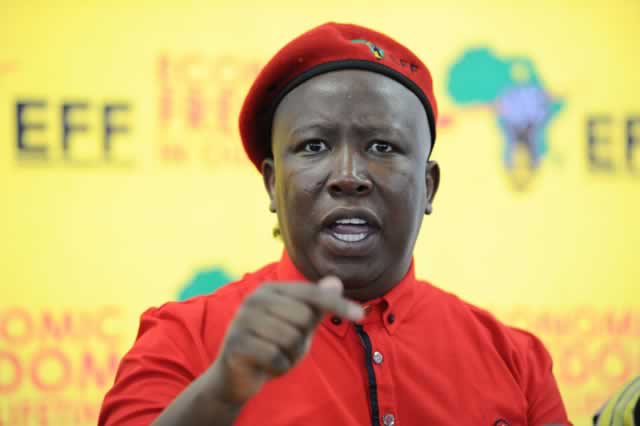
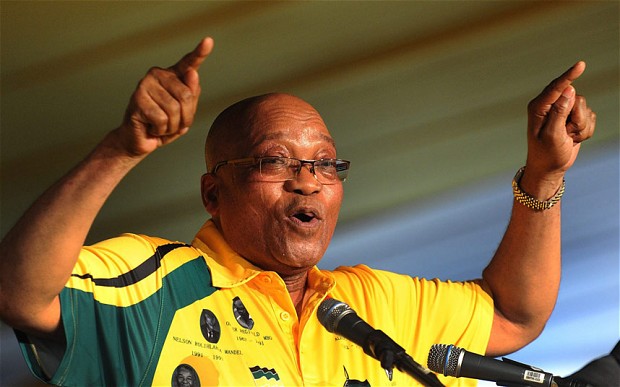
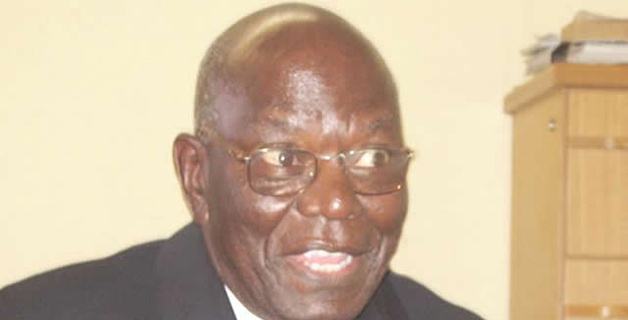
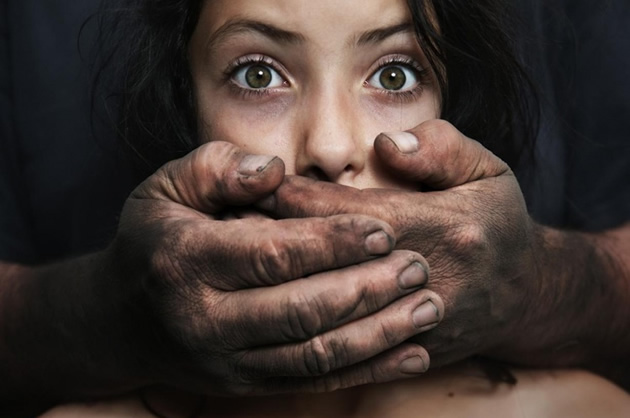




Comments